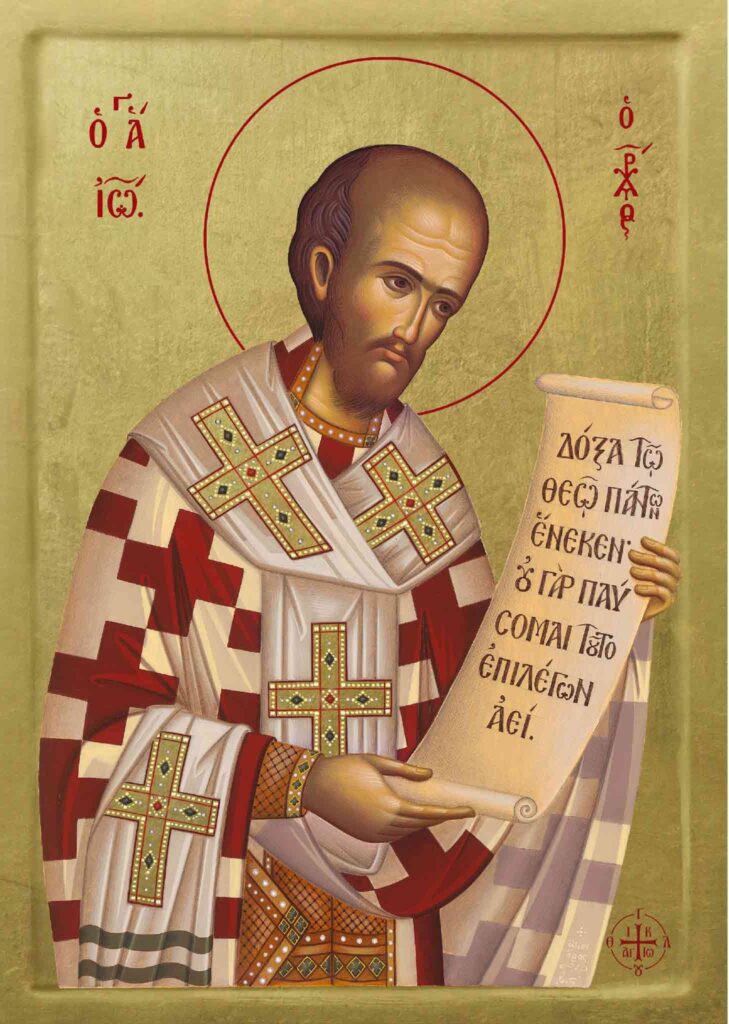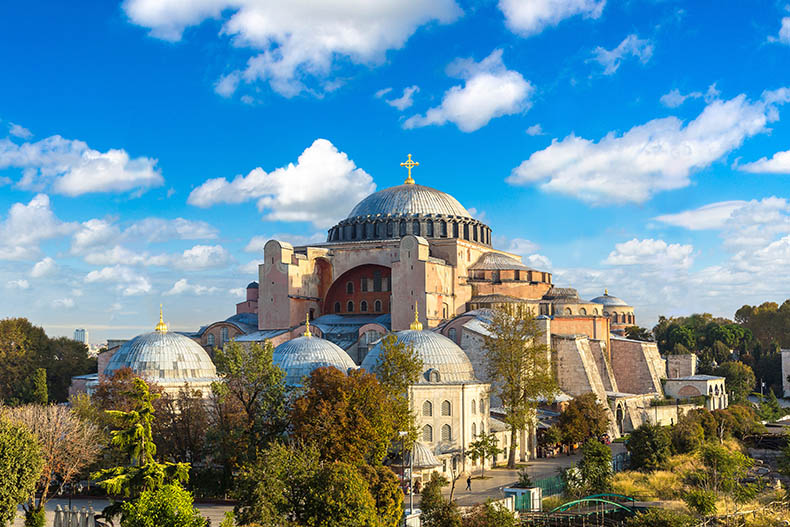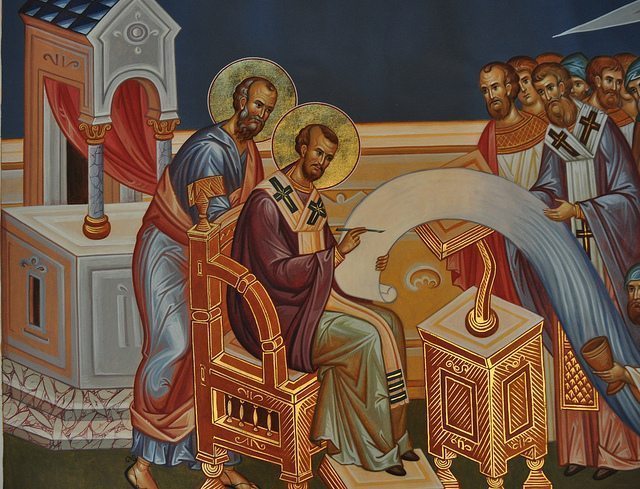Introduction: Why Chrysostom Still Matters Today
In an age of moral confusion and spiritual hunger, the life and teachings of Saint John Chrysostom (c. 347-407 AD) shine with startling relevance. This brilliant preacher, exiled bishop, and tireless advocate for the poor left an indelible mark on Christianity that continues to shape Orthodox worship and social ethics nearly sixteen centuries after his death.
Known universally as “Chrysostom” (Golden-Mouthed) for his extraordinary preaching gifts, this Antiochian monk turned Constantinople’s archbishop combined intellectual brilliance with practical spirituality in a way that transformed his generation – and continues to challenge ours. His story is one of:
Uncompromising truth-telling to emperors and empresses
Revolutionary care for the poor that shamed the wealthy
Literary output that dwarfs most modern theologians
Ultimate sacrifice through persecution and exile
This in-depth exploration will examine his remarkable life, enduring theological contributions, and why his example remains vital for Christians navigating today’s complex world.
Early Life and Education: From Pagan Rhetoric to Christian Truth
A Childhood Shaped by Loss and Faith
Born around 347 AD in the cosmopolitan city of Antioch, young John’s life took a tragic turn when his father Secundus, a high-ranking military officer, died shortly after his birth. His mother Anthusa, only 20 years old at her husband’s passing, made the extraordinary decision to remain unmarried – an unusual choice in Roman society – and devoted herself completely to her son’s upbringing.
Anthusa’s Christian devotion planted seeds that would later flourish spectacularly. As Chrysostom himself later wrote: “My mother’s widowhood was harder than any other, for she was left without any consolation at the very height of her youth.”

Education Under Libanius: Mastering Pagan Eloquence
Recognizing her son’s intellectual gifts, Anthusa secured for him the finest education available under Libanius, the most celebrated pagan rhetorician of the age. This training in classical Greek literature and oratory would later prove invaluable when turned to Christian purposes.
Libanius reportedly said of his star pupil: “My gods, what a man we have lost to the Christians!” when John chose theological studies over a secular career.
Spiritual Awakening and Monastic Longing
At about age 18, John experienced a profound conversion under the guidance of Bishop Meletius of Antioch, who baptized him in 367 AD. Drawn to asceticism, he initially embraced extreme monastic practices in the mountains near Antioch. However, his health deteriorated so severely from self-denial that he was forced to return to the city – a humbling experience that tempered his later pastoral approach.
The Golden-Mouthed Preacher of Antioch
Rise Through the Clerical Ranks
John’s spiritual and intellectual gifts didn’t go unnoticed:
-
381 AD: Ordained deacon by Bishop Meletius
-
386 AD: Ordained priest by Bishop Flavian
-
Appointed chief preacher of Antioch’s Great Church
Revolutionary Biblical Preaching
Chrysostom transformed Christian homiletics by:
-
Introducing verse-by-verse exposition of Scripture (still the standard today)
-
Making theology accessible to ordinary people
-
Connecting biblical truth to daily life
His marathon preaching feats included:
-
32 Homilies on Genesis delivered during Lent 388
-
90 Homilies on Matthew’s Gospel over several years
-
88 Homilies on John’s Gospel
-
55 Homilies on Acts of the Apostles
Social Justice Warrior of the 4th Century
Chrysostom’s sermons consistently challenged economic inequality:
-
“Not to share our wealth is to steal from the poor.”
-
“The rich are merely stewards of what belongs to God.”
-
“Almsgiving is greater than miracles because it imitates God’s generosity.”
Under his leadership, the Antioch church:
-
Fed 3,000 widows daily
-
Supported hospitals and homeless shelters
-
Provided interest-free loans to the poor

Archbishop of Constantinople: Reforming the Imperial Church
Unexpected Promotion (397 AD)
Against his wishes, John was forcibly taken to Constantinople and consecrated archbishop. His reforms began immediately:
Sold luxurious episcopal furnishings to fund hospitals
Cut clergy salaries to eliminate greed
Forbade priests from keeping “spiritual friendships” with wealthy women
Confronting Imperial Power
His fearless preaching targeted corruption at the highest levels, including Empress Eudoxia’s:
Extravagant wardrobe expenses
Seizure of widow’s properties
Vanity projects like her silver statue near Hagia Sophia
His famous declaration: “Again Herodias rages; again she demands John’s head!” sealed his fate.
Exile and Death: The Cost of Truth-Telling
First Exile (403 AD)
Lasted only weeks due to public outcry
Earthquake interpreted as divine judgment
Eudoxia herself begged his return
Final Exile (404 AD)
Forced march through brutal conditions
Wrote 245 surviving letters of encouragement
Died September 14, 407 at Comana
His last words: “Glory to God for all things!” became his eternal epitaph.
Enduring Legacy: Why Chrysostom Still Speaks
Liturgical Revolution
Divine Liturgy of St. John Chrysostom: Used most Sundays in Eastern Orthodoxy
Paschal Homily: Read annually at Orthodox Easter
Sacramental theology that shapes Eastern Christian worship
Theological Contributions
Scriptural Interpretation: Balanced literal and spiritual meanings
Priesthood: His “Six Books on the Priesthood” remains essential reading
Social Ethics: Blueprint for Christian engagement with poverty
Modern Relevance
In an era of:
Growing economic inequality
Clerical scandals
Biblical illiteracy
Chrysostom’s example offers:
Model for prophetic preaching
Framework for just economics
Vision for authentic Christian leadership
Conclusion: The Unquenchable Voice
From the imperial halls of Constantinople to the remote exile of the Caucasus, John Chrysostom’s golden mouth never ceased proclaiming God’s truth. His life proves that:
“The blood of martyrs is the seed of the Church” (Tertullian) applies not just to physical martyrdom but to those who, like Chrysostom, willingly embrace suffering for truth’s sake.
As we face our own challenges today – whether spiritual, moral, or social – we would do well to heed this golden-mouthed saint who showed us how to:
Preach fearlessly
Serve compassionately
Suffer faithfully
His final words remain our best response to both joy and trial: “Glory to God for all things!”

